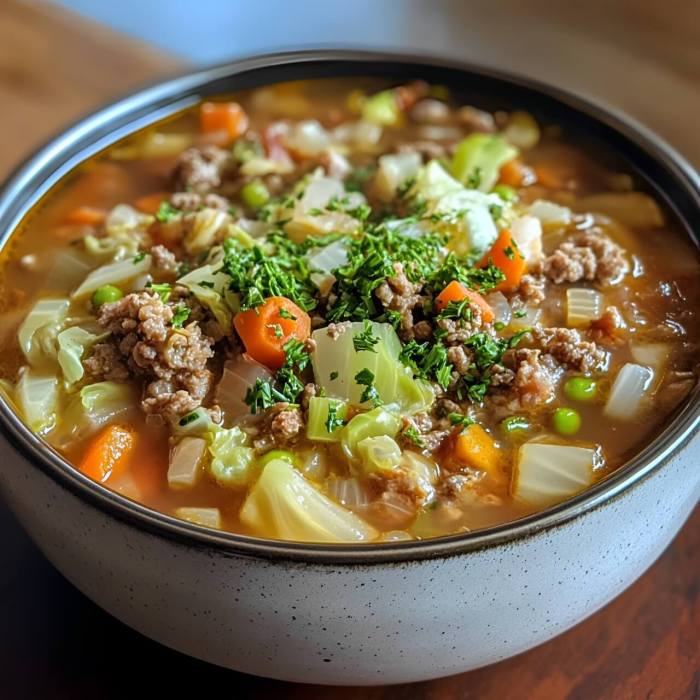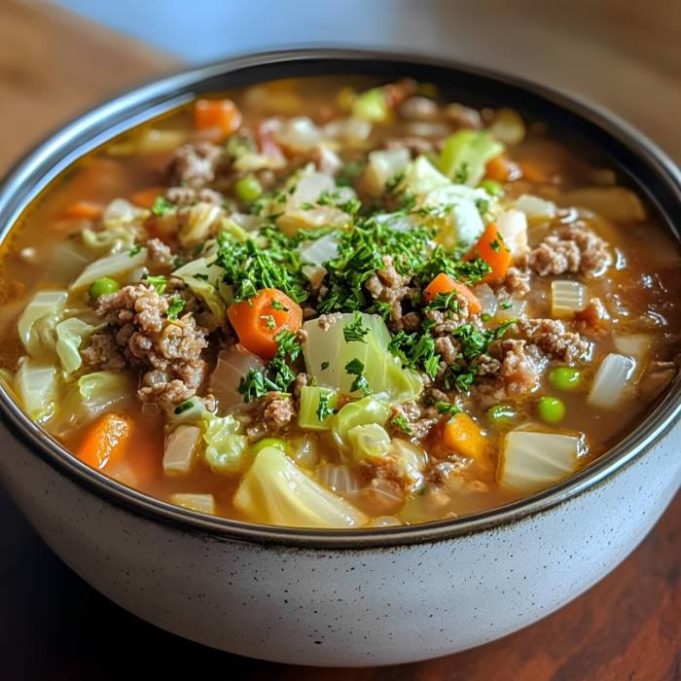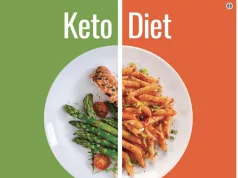How to make diet cabbage soup, a staple of many weight-loss plans, is a question that often pops up. This soup, known for its low-calorie and filling nature, has become a popular choice for those seeking a quick and easy way to shed a few pounds. While cabbage soup diets have been around for decades, their effectiveness and long-term impact remain a topic of debate. This guide delves into the history and popularity of cabbage soup diets, providing a basic recipe, exploring variations, and offering meal planning tips. We also discuss the potential benefits and drawbacks of this approach, emphasizing the importance of consulting a healthcare professional before embarking on any diet.
Cabbage soup, with its versatility and adaptability, can be customized to suit various dietary needs and preferences. Whether you’re looking for a vegetarian option, a low-sodium version, or a soup packed with flavor, this guide provides the information you need to create a delicious and satisfying cabbage soup that aligns with your goals. From basic recipes to variations and meal planning strategies, this comprehensive guide empowers you to make informed decisions about incorporating cabbage soup into your diet.
Introduction to Cabbage Soup Diets
Cabbage soup diets have been around for decades, gaining popularity as a quick and easy way to shed pounds. These diets typically involve consuming large amounts of cabbage soup, often with limited portions of other foods, for a short period, usually 7 days.
The appeal of cabbage soup diets lies in their simplicity and perceived effectiveness. The soup is low in calories and high in fiber, which can contribute to a feeling of fullness and potentially aid in weight loss.
Potential Benefits of Cabbage Soup Diets
Cabbage soup diets can lead to rapid weight loss due to their low calorie intake. However, this weight loss is primarily water weight and muscle mass, not fat.
Potential Drawbacks of Cabbage Soup Diets
Cabbage soup diets are often restrictive and lack essential nutrients. They can lead to nutritional deficiencies, fatigue, and digestive problems. Additionally, the rapid weight loss achieved is often temporary, as individuals tend to regain the lost weight once they resume their normal diet.
Importance of Consulting a Healthcare Professional
It’s crucial to consult with a healthcare professional before starting any diet, especially one as restrictive as a cabbage soup diet. They can assess your individual needs, provide personalized advice, and ensure that the diet is safe and appropriate for you.
Basic Cabbage Soup Recipe: How To Make Diet Cabbage Soup

This classic cabbage soup recipe is a staple of many weight-loss diets due to its low-calorie content and filling nature. It’s also incredibly versatile, allowing you to customize it with your favorite vegetables and seasonings.
Basic Cabbage Soup Recipe
This recipe yields about 8 servings, with each serving containing approximately 100 calories.
Ingredients:
* 1 large head of green cabbage, chopped
* 2 medium onions, chopped
* 2 green bell peppers, chopped
* 2 (14.5 ounce) cans diced tomatoes, undrained
* 1 (15 ounce) can low-sodium chicken broth
* 4 cups water
* 1 teaspoon salt
* 1/2 teaspoon black pepper
Instructions:
1. In a large pot or Dutch oven, combine all ingredients.
2. Bring to a boil over medium-high heat, then reduce heat to low, cover, and simmer for 30 minutes, or until the vegetables are tender.
3. Stir occasionally and adjust seasonings to taste.
Nutritional Information Per Serving, How to make diet cabbage soup
The following table provides an approximate nutritional breakdown per serving of the basic cabbage soup recipe:
| Nutrient | Amount |
|—|—|
| Calories | 100 |
| Protein | 4 grams |
| Carbohydrates | 18 grams |
| Fat | 1 gram |
| Fiber | 5 grams |
| Sodium | 400 mg |
Tips for Customizing the Recipe
You can easily customize this recipe to suit your preferences. Here are some tips:
* Add different vegetables: Feel free to experiment with other vegetables like carrots, celery, zucchini, or spinach.
* Include lean protein: Add cooked chicken, turkey, or lean ground beef for extra protein.
* Spice it up: Experiment with different herbs and spices like cumin, oregano, chili powder, or garlic powder.
* Use vegetable broth: For a vegetarian option, use vegetable broth instead of chicken broth.
* Add a little bit of heat: For a spicy kick, add a pinch of cayenne pepper or a few drops of hot sauce.
Variations of Cabbage Soup
The basic cabbage soup recipe is a versatile foundation that can be adapted to suit various dietary needs and preferences. You can explore different flavor profiles, adjust the ingredients for specific nutritional goals, and add a variety of toppings to create a personalized and satisfying meal.
Cabbage Soup Variations
The following table showcases some popular variations of cabbage soup, highlighting their key ingredients, dietary focus, and potential benefits and drawbacks:
| Soup Name | Key Ingredients | Dietary Focus | Benefits and Drawbacks |
|---|---|---|---|
| Traditional Cabbage Soup | Cabbage, onions, carrots, celery, tomatoes, vegetable broth | Low-calorie, low-fat |
|
| Spicy Cabbage Soup | Cabbage, onions, carrots, celery, tomatoes, vegetable broth, jalapeno peppers, chili powder | Low-calorie, low-fat, spicy |
|
| Vegetarian Cabbage Soup with Lentils | Cabbage, onions, carrots, celery, tomatoes, vegetable broth, lentils | Vegetarian, high in protein |
|
| Low-Sodium Cabbage Soup | Cabbage, onions, carrots, celery, tomatoes, low-sodium vegetable broth | Low-sodium, low-calorie |
|
Serving Suggestions and Meal Planning
Cabbage soup can be a versatile and delicious addition to your diet, providing a healthy and satisfying meal option. It can be enjoyed as a standalone meal or incorporated into a balanced meal plan, ensuring you get the nutrients you need while sticking to your dietary goals.
Meal Planning Ideas
Here are some ideas on how to incorporate cabbage soup into your meal plan:
- Start your day with a bowl of cabbage soup for a light and filling breakfast, especially if you are looking for a way to manage your calorie intake. You can pair it with a slice of whole-grain toast or a piece of fruit for added energy and nutrients.
- Enjoy cabbage soup as a satisfying and healthy lunch. You can add a side salad with a light vinaigrette dressing or a small portion of grilled chicken or fish for a more substantial meal.
- Cabbage soup can be a perfect dinner option, especially if you are trying to reduce your calorie intake. You can serve it with a side of brown rice or quinoa for a complete and balanced meal. You can also add lean protein sources like grilled chicken or fish to your soup for added protein and flavor.
Pairing Cabbage Soup with Other Healthy Foods
Cabbage soup is a blank canvas for healthy meal combinations. Here are some tips for pairing cabbage soup with other healthy foods:
- Lean Protein: Combine cabbage soup with lean protein sources like grilled chicken, fish, or tofu for a complete and satisfying meal. These protein sources provide essential amino acids that are crucial for muscle building and repair, as well as overall health.
- Whole Grains: Pair cabbage soup with whole grains like brown rice, quinoa, or whole-wheat bread for added fiber and complex carbohydrates. These grains provide sustained energy and promote digestive health.
- Fresh Vegetables: Enhance the flavor and nutritional value of your cabbage soup by adding fresh vegetables like carrots, celery, onions, or spinach. These vegetables provide vitamins, minerals, and antioxidants that support overall health.
- Healthy Fats: A drizzle of olive oil or a sprinkle of nuts can add healthy fats to your cabbage soup, making it more satisfying and flavorful. These healthy fats are essential for hormone production, cell function, and overall health.
Sample Meal Plan
Here is a sample meal plan that incorporates cabbage soup:
| Day | Breakfast | Lunch | Dinner |
|---|---|---|---|
| Monday | Cabbage Soup with a slice of whole-grain toast | Cabbage Soup with a side salad and grilled chicken | Cabbage Soup with brown rice and steamed broccoli |
| Tuesday | Cabbage Soup with a piece of fruit | Cabbage Soup with a side of quinoa and grilled fish | Cabbage Soup with whole-wheat bread and a side of roasted vegetables |
| Wednesday | Cabbage Soup with a small bowl of oatmeal | Cabbage Soup with a side of brown rice and tofu scramble | Cabbage Soup with a side of whole-grain pasta and marinara sauce |
| Thursday | Cabbage Soup with a piece of fruit | Cabbage Soup with a side salad and grilled chicken | Cabbage Soup with a side of quinoa and roasted vegetables |
Safety and Considerations
While cabbage soup diets can lead to quick weight loss, it’s crucial to be aware of potential side effects and the importance of a balanced approach to weight management.
Potential Side Effects
Cabbage soup diets are very low in calories and nutrients, and following them for extended periods can lead to several potential side effects.
- Nutrient Deficiencies: The limited variety of foods in a cabbage soup diet can lead to deficiencies in essential vitamins and minerals, such as iron, calcium, and vitamin D. These deficiencies can cause fatigue, weakness, and other health problems.
- Digestive Issues: The high fiber content in cabbage can cause bloating, gas, and diarrhea in some individuals, especially if consumed in large quantities.
- Muscle Loss: The low calorie intake and lack of protein can lead to muscle loss, which can weaken the body and affect metabolism.
- Headaches and Dizziness: The sudden change in diet and low calorie intake can lead to headaches and dizziness, particularly during the initial days of the diet.
- Dehydration: Cabbage soup diets can lead to dehydration if not enough water is consumed. This is because the body loses fluids through increased urination due to the high potassium content in cabbage.
Staying Hydrated
Drinking plenty of water is essential when following a cabbage soup diet to prevent dehydration and support overall health. Aim for at least 8 glasses of water per day, and more if you are exercising or sweating.
Balanced Diet and Exercise
While cabbage soup diets can help with short-term weight loss, they are not sustainable for long-term health. A balanced diet rich in fruits, vegetables, lean protein, and whole grains, combined with regular exercise, is the key to maintaining a healthy weight and overall well-being.
Final Review
While cabbage soup diets can be a temporary tool for weight loss, it’s essential to remember that sustainable weight management requires a balanced diet and regular exercise. This guide has provided a comprehensive overview of cabbage soup diets, from their history and potential benefits to recipes, variations, and meal planning ideas. Remember, always consult a healthcare professional before making significant changes to your diet. By incorporating the information and tips provided, you can make informed decisions about using cabbage soup as part of a healthy and balanced lifestyle.
Key Questions Answered
How long can I eat cabbage soup for?
It’s generally recommended to limit cabbage soup diets to a few days, as they lack essential nutrients and can lead to nutritional deficiencies.
Can I add meat to the cabbage soup?
Yes, you can add lean meats like chicken or turkey to your cabbage soup for additional protein.
Is it safe to eat cabbage soup every day?
While cabbage soup can be a healthy addition to your diet, eating it every day can lead to nutrient deficiencies and digestive issues.
What are the side effects of a cabbage soup diet?
Potential side effects include bloating, gas, diarrhea, and nutrient deficiencies.
Diet cabbage soup is a classic for weight loss, and you can make it even more nutritious by adding bone broth. Bone broth is a great source of collagen, which is important for healthy skin, hair, and joints. If you want to learn more about incorporating collagen into your diet, check out this article on how to get collagen in your diet.
Once you’ve got your collagen boost, you can get back to making your soup! Just simmer the cabbage with onions, carrots, celery, and spices for a delicious and filling meal.
Making diet cabbage soup is a simple way to enjoy a light and flavorful meal. You can use a variety of vegetables and spices to customize the recipe to your liking. The types of ingredients you choose can actually influence the type of diet you’re following, which is something to consider if you’re on a specific diet like those found in hospitals, types of diet in hospital.
For example, a clear liquid diet might require you to use only broth and vegetables that can be easily pureed. No matter what type of diet you’re on, a simple cabbage soup can be a satisfying and healthy option.
Making diet cabbage soup is a great way to get your daily dose of vegetables, and it’s especially helpful if you’re following a specific diet. For example, if you’re looking for what diet for diverticulitis , you’ll want to choose low-fiber options like cabbage soup, which is easy to digest.
When making diet cabbage soup, remember to avoid adding high-fiber ingredients like beans or lentils.
























